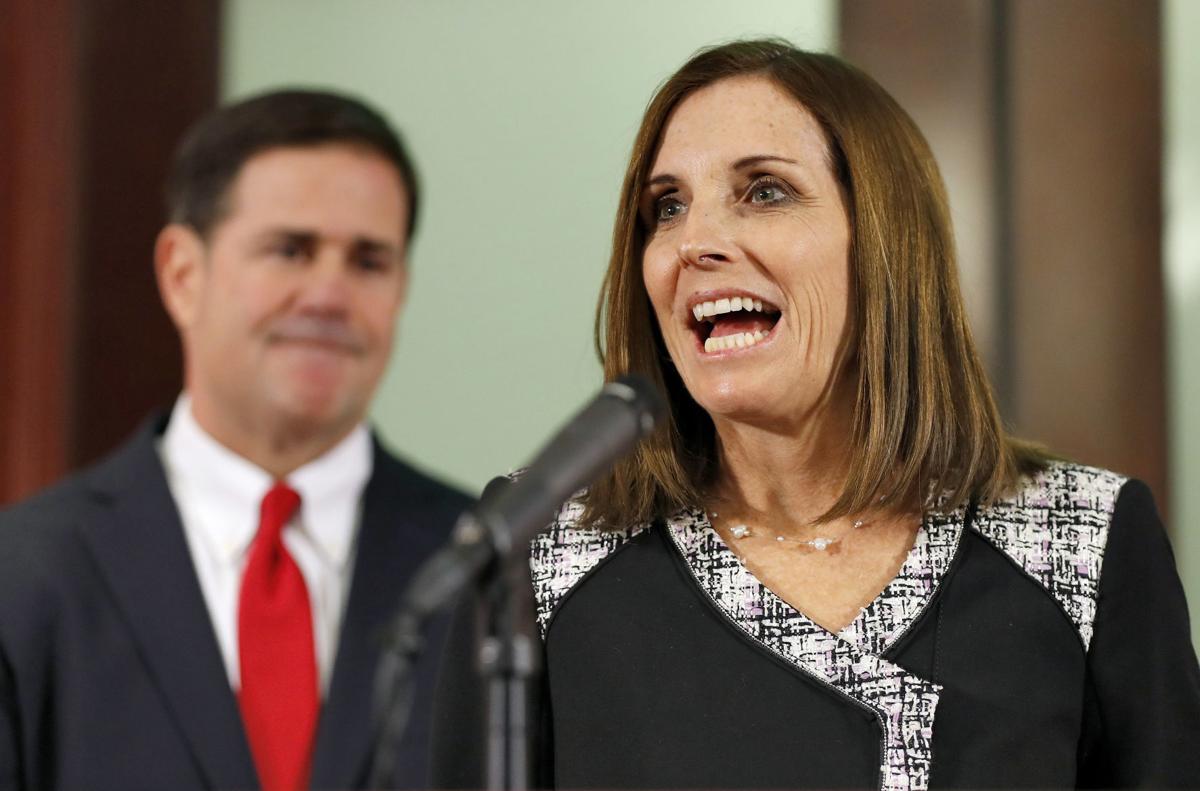PHOENIX — An attorney for members of various political parties told a federal judge Friday she should order a statewide election — and soon — to let voters fill the Senate seat now occupied by Martha McSally.
Gov. Doug Ducey initially appointed Jon Kyl to the vacancy created last year by the death of Sen. John McCain. When Kyl quit in January, Ducey tapped McSally, a Tucson Republican.
Attorney Michael Persoon told Judge Diane Humetewa that Ducey had no right under the U.S. Constitution to have McSally hold the seat until the 2020 general election.
He said the governor is required to give voters a chance as soon as possible to decide who should be their senator. Persoon said that means within 100 days of the vacancy. That date is long past; McCain died on Aug. 25.
But Persoon said there’s still plenty of time for Humetewa to allow voters to weigh in.
But Michael Liburdi, representing the governor, said Ducey acted in accordance with state laws.
If a vacancy in the U.S. Senate occurs within 150 days of the next scheduled election — as happened here — then the governor can name someone to hold the spot until the following general election, Liburdi said. And that means November 2020.
Persoon did not dispute that’s what state laws say. But he contends they violate constitutional provisions requiring that voters get their say as soon as possible.
He also wants Humetewa to void another provision in state law which says whoever the governor picks, whether on a shorter- or longer-term basis, has to be of the same political party as the senator being replaced.
Persoon told the judge that Barry Hess, one of his clients, would have liked to have had the opportunity to offer his name for the vacancy. Hess is a Libertarian who has run for governor, unsuccessfully, for more than a decade.
Liburdi defended the requirement, saying it ensures some continuity in the state’s political representation in the Senate.
He also suggested to Humetewa that the whole question is sort of silly, because if Ducey is forced to make a new pick, regardless of political party, he still would choose McSally.
The heart of the legal fight is the 17th Amendment to the U.S. Constitution added in 1913. It took the power to appoint U.S. senators away from state legislatures and provided for direct election, the same as has always been true for members of the House of Representatives.
That amendment also says when there are vacancies, the governor “shall issue writes of election to fill such vacancies.” But it also says that state lawmakers may allow the governor to “make temporary appointments until the people fill the vacancies by election as the legislature may direct.”
Liburdi said that last line is what backs the Arizona law saying any vacancy within 150 days of a scheduled election can be put off until the next general election.
Anyway, he told the judge that makes more sense than calling a special election, due to the expense and the anticipated low turnout.
Persoon, however, said 27 months — the time between McCain’s death and the 2020 general election — is far too long to leave the Senate seat in the hands of a political appointee.
He said there’s no reason Ducey cannot call for a special election sometime this year, giving voters a chance to decide who they want in the interim and not Ducey’s choice of McSally, who actually lost her own Senate bid last year to Democrat Kyrsten Sinema.
Persoon brushed aside concerns about cost and turnout, pointing out that such special elections already are required for vacancies in the U.S. House.
After U.S. Rep. Trent Franks, R-Ariz., resigned last year amid an investigation by the House Ethics Committee, an election for his seat was set for the following April.
Republican Debbie Lesko defeated Democrat Hiral Tipirneni in that vote. Lesko had to run again for re-election in November — a race she also won.
Liburdi said that quick turnaround occurred because, unlike the Senate, there is no legal provision for the governor to fill vacancies in the U.S. House, even on a temporary basis.
He rejected Persoon’s argument that having to wait until the 2020 election interferes with the right of Arizonans, including Persoon’s clients, to choose who represents them in the Senate.
“The plaintiffs have a right to vote,” Liburdi told the judge. “They will have a right to choose a successor to John McCain.”
It will just have to wait until next year, he said.
No date has been set for a decision by Humetawa.





